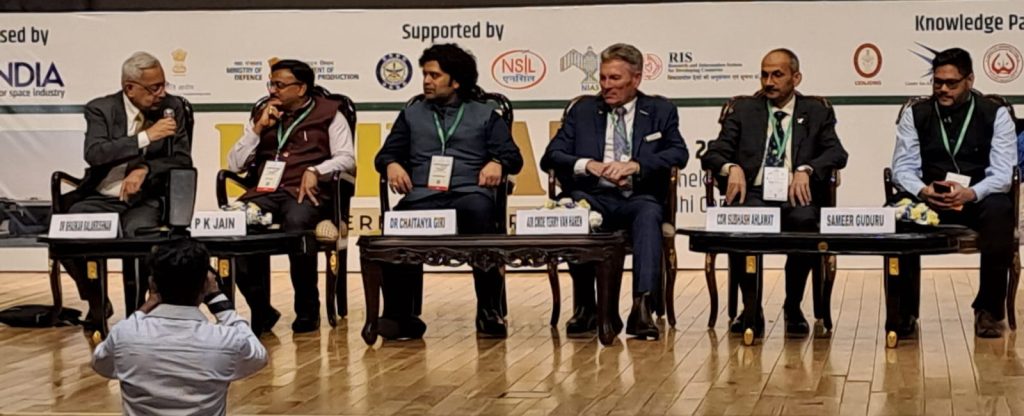The use of SpaceX’s Starlink satellites in the ongoing Russia-Ukraine War has brought home the threats of potential space war and how the need for space diplomacy needs to be conducted moving forward. To debate this, a panel at the recently concluded DefSat Conference and Expo, of which Interstellar was a media partner, sat down to examine the challenges and the best moves to maintain space cooperation. Chairing the session, Ambassador Bhaskar Balakrishnan, Fellow for Science Diplomacy at the Research and Information System for Developing Countries, New Delhi (see interview), held that while there was still cooperation between member nations as seen through international organisations such as Committee on the Peaceful Uses of Outer Space (COPUOS) of which India is the present Chair.
Geopolitical tensions and lack of legal clarity on space contribute to the militarization of space. “International cooperation is certainly hindered by the Ukraine-Russia conflict and the US-China tensions. There is a trend towards militarising space through dual-purpose satellites and the development of ASAT technology which the US has issued a declaration to suspend. There is a lack of legal clarity regarding the use of commercial entities. If a commercial entity works in space, under what law does it come? Does it come under the home country’s law or the regime of the country under which it is operating? Such legal loopholes must be cleared up as they can lead to misunderstandings.”
Air Commodore Terry Van Haren DSM Retd, MD Leolabs Australia, seconded ambassador Balakrishnan’s remarks. Speaking on the need for cooperation and transparency in the international space domain, the Air Commodore pointed out the need for traditional diplomats, especially defence attaches worldwide, to step up and understand the space environment around them. “I learnt this lesson in 2018-19 when I was the defence attache to Washington, where we ended up doing two war games with the US. It was here that I learnt there was a commercial entity called Starlink which would play a very important role in space.”
The Air Commodore also pointed out that Starlink showed that commercial entities would be vital in projecting national space power. That was why transparency was even more crucial than ever between nations. “When it comes to diplomacy, what is key is the information that is being provided from the commercial companies and from our governments to ensure that diplomacy around the world is very well informed as to what is going on in the space environment, what the risks are in terms of safety due to the space debris especially when it comes to the risk of large constellations in particular. We cannot conduct civilian or commercial space operations if there is a lack of safety in space, and we have to cooperate on that.” He added that was especially important today as there was an “escalating threat environment of space”, especially in the non-lethal sphere for which immediate real-time information was needed.
“I have great hope diplomatic efforts between countries and share the right information on how they can maintain the consensus in space. This is going to be even more important if there is conflict. Where we see it as a company operating in LEO (Low Earth Orbit), the road to the crisis is mostly between China and the US where their doctrine says they will protect space if they are threatened by a major actor,” he said.
The US-China conflict threatens to undermine the rise of international and regional bodies that have come up over the years to ensure cooperation in space. From ESA (European Space Agency), a 22-member-body to ISS (International Space Station) to the emergence of regional space groups such as the African, Latin American and Caribbean space agencies and an Arab Space Co-ordination Group, there certainly seems a will among nations to cooperate in space. However, the lack of mistrust between the US and China may undermine this spirit of cooperation.
Beijing views the US-led Artemis Accords with scepticism and what some observers believe to be a little fear. Introduced in 2020, the accords, which are non-binding, promise to help take member nations to the moon by 2025 and establish a framework of cooperation between the Moon and Mars. China, which has already landed a spacecraft on the moon in 2019 and a rover on Mars in 2021, is suspicious of what it sees as a US-led coalition against its space interests. The US and its allies remain suspicious of China’s behaviour. China is a leading member of the Asia Pacific Space Cooperation Organization (APSCO). The body was set up in 2005 and includes member nations such as Pakistan, Bangladesh and Iran. Ambassador Balakrishnan said, “This organisation seeks to develop and launch satellites and use the Chinese Beidou navigation system,” countering GPS. “This could increase the dependence of countries on China,” he said.
While these geopolitical tensions are likely to hamper space cooperation, the next question that needs to be asked is what should be India’s role in the international space domain. PK Jain, Director PMAD, In-SPACe, believes India can use its extensive knowledge to play a more decisive role in space. Jain said the new space policy had already directed the Department of Space to work more closely with the MEA. “We need to leverage India’s strengths, and we can do that through its presidency of the G-20. We already had a G-20 meeting on space in Shillong; in that, not only the only G-20 nations but also the other friendly nations were present. We are going to have another meeting in Bangalore now. This was a preparatory meeting. We also need to leverage the technological prowess of ISRO and its standing among the space agencies. We have been doing it, but we can do it on a larger scale. We should leverage its capability of making satellites for other countries and use it for programs such as education and telemedicine.”





